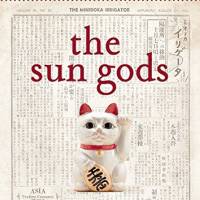Set between 1939 and 1963, "The Sun Gods" tells the story of Tom Morton, a Seattle pastor and widower, who falls in love with Japanese immigrant Mitsuko Fukai. They marry but their happiness is soon shattered by the attack on Pearl Harbor and Tom's reaction to it. Years later, his son Bill attempts to discover Tom's bitterly guarded secrets, a quest that inevitably takes him to Japan.
The Sun Gods
Jay Rubin
320 pages.
Chin Music Press, Fiction.
Jay Rubin's first novel is, in many ways, exactly what you would expect from an experienced translator of Japanese literature. Some sections of "The Sun Gods" are likely semi-autobiographical — the student struggling with the Japanese language, the American in Japan for the first time — and many of the tropes exploring differences between the West and Japan are trotted out. Fortunately there is a lot more going on.
While the "American in Tokyo" plot-strand retreads ground, Rubin has something new and interesting to say about the experience of Japanese in America during World War II. As the story moves to the internment camps in the U.S. — a topic regularly passed over as an "unfortunate incident" in American history — the prose shifts up a gear and the book really comes alive. There is passionate outrage in these pages, backed by exhaustive research and the scenes here are dramatic and gut-wrenching.
Rubin's wider plot and the necessity of narrative progress, however, don't permit the time and depth the subject deserves.
"The Sun Gods" is surprising, heartbreaking and powerful. At a time when Japan is being pushed on all sides to confront its history, this novel is a welcome reminder that when it comes to war, no one holds the moral high ground.



















With your current subscription plan you can comment on stories. However, before writing your first comment, please create a display name in the Profile section of your subscriber account page.